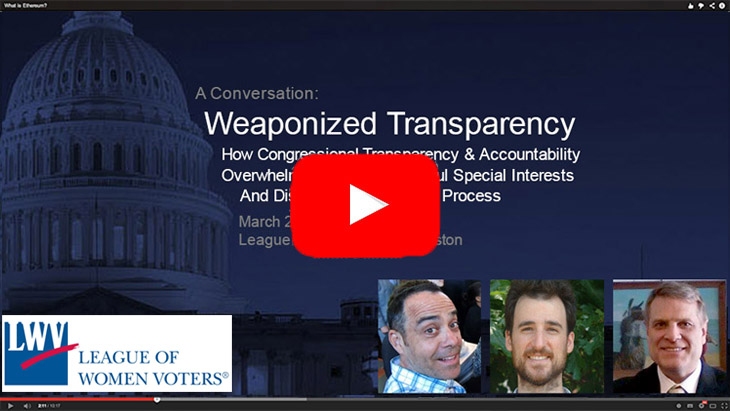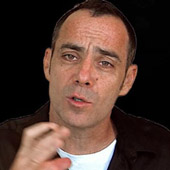A Conversation:
Weaponized
Transparency
How transparency and accountability overwhelming favor special interests
By D’Angelo – A talk with the League of Women Voters, Boston March 22, 2017
The Video
Does the President of the United States wield too much power? Can Congress respond? Can we solve the soaring rise in income inequality? Is there any way to reel in the power of special interest groups and lobbying?
In a conversation hosted by the League of Women Voters, congressional researcher, James D'Angelo, will present his groundbreaking work on the troubles with transparency and accountability. In his recent research, D'Angelo has uncovered a painful and unintended consequence of a series of 1970 congressional reforms – all congressional transparency and accountability overwhelmingly favor powerful special interests (including the President), which has lead to the likely rise of lobbying, bank failures and bailouts, incarceration rates and more.
His work focuses on the 1970 Legislative Reorganization Act which opened all congressional committees, investigations and hearings. He will also explain how transparency is weaponized creating a legislative minefield that corrupts the legislative process. This talk is a preview of his paper which will debut in April at the MPSA in Chicago. His coauthors are David C. King (Senior Lecturer in Public Policy at the Harvard Kennedy School) and Brent Ranalli.
Come join the conversation, Wednesday March 22nd. Brookline Town Hall, 333 Washington St., Brookline, MA 02446. 6:30pm refreshments, 7 pm Talk. Admission is free and open to the public.
Speaker
Summary
Several important steps toward legislative transparency in the 1970s have fundamentally altered how the U.S. Congress and state legislatures operate. Some of these reforms, like mandating recorded votes in the Committee of the Whole and opening up Conference Committees to public view, were widely supported in the wake of the escalation of the Vietnam war. Congressional reforms were quickly mirrored in other legislatures.
We explore the origins of these reforms, highlighting the 1970 Legislative Reorganization Act. Key reforms were inserted by lobbyists seeking to more efficiently monitor the behavior of legislators. Representatives adjusted by changing their behavior on votes in the Committee of the Whole, which soon became a contentious proving ground for ideological purity and fidelity to special interests and party leadership. We elaborate on theories of representation to understand how behaviors change when different types of monitoring are in place.
Consistent with the theory, increases in transparency were followed by increased narrow-interest lobbying, wasteful and pernicious legislative gamesmanship, increased partisanship, and more. And we investigate these changes as likely drivers for income inequality, climate change, gridlock and demosclerosis. Finally, we call attention to specific new reforms that could reestablish deliberative spaces for legislators.
The discussion took place from 4-5pm on November 21st at the Carr Center for Human Rights Policy at the Harvard Kennedy School. It was followed by an untaped question and answer session from 5pm-5:30.




